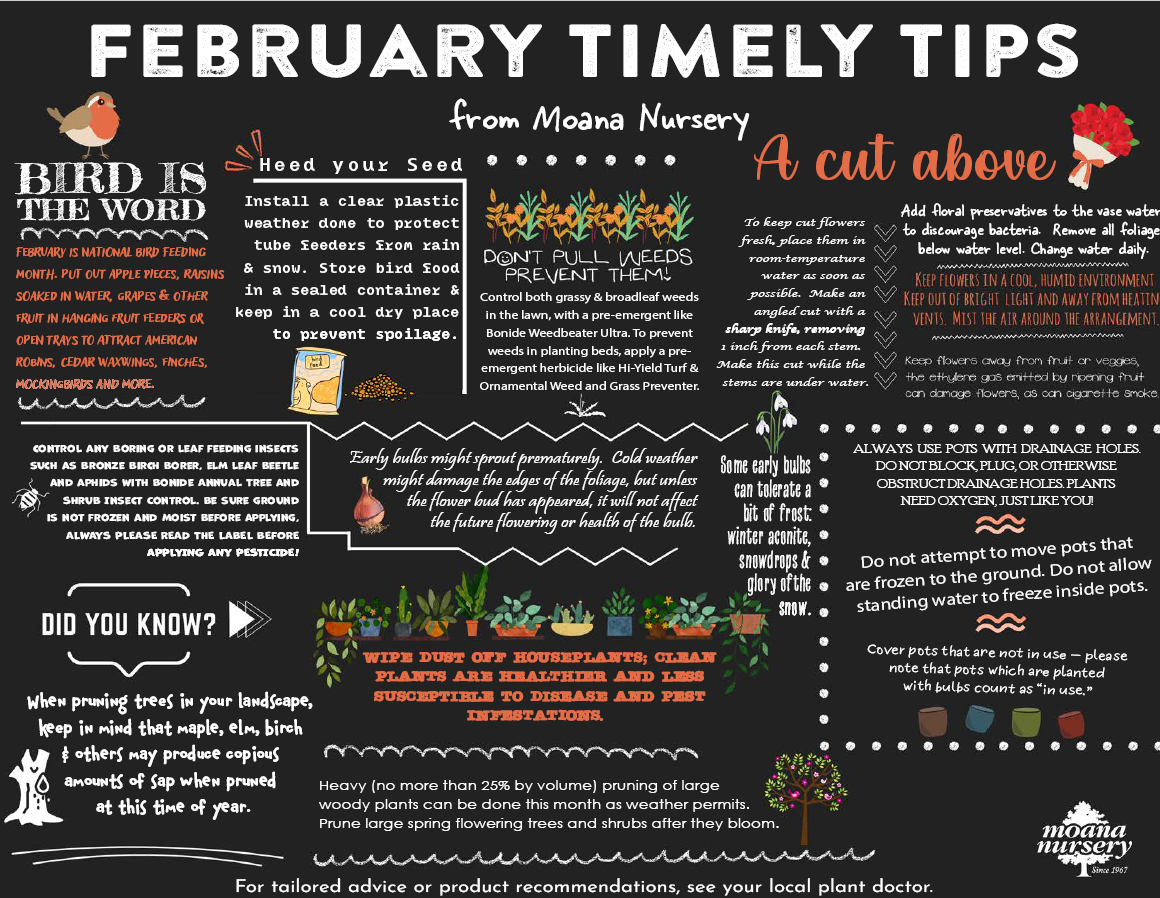Plants in the ground, especially newly planted trees, shrubs & perennials, need the equivalent of one inch of precipitation per month. Plants in containers need more since they dry out faster. If you haven’t checked your soil moisture and watered as needed already, it’s time to do so! Read on for more timely gardening tips!
Plant Doctor Quips
February
Moana Nursery High Desert Gardening
Timely Tips
- Remember, plants in the ground, especially newly planted trees, shrubs and perennials, need the equivalent of one inch of precipitation per month. Plants in containers need more since they dry out faster. If natural precipitation does not occur, this will be necessary throughout the winter. Visit this helpful link on high desert winter watering.
- Check soil moisture around all your plants; with the relatively dry winter and spotty precipitation, you may find dry areas around at least some of your plants. Water accordingly.
- Continue to check plants for signs of damage from animals or weather.
- To prevent weeds, apply Hi-Yield Turf & Ornamental Weed & Grass Stopper or Hi-Yield Herbicide Granules Weed & Grass Preventer pre-emergent herbicide to planting beds when you see early signs of spring such as crocus emerging or the forsythia blooming – applying at this time will control many cool season weeds.
- To control both grassy and broadleaf weeds in lawns, apply Bonide Weed Beater Complete, a pre-emergent and post-emergent, in late February or early March as weather permits. Apply in calm weather when rain is not predicted for the next 24 hrs. For best results, apply to a damp lawn and after 48 hrs water it in.
- To control any boring or leaf feeding insects such as bronze birch borer & elm leaf beetle and aphids in trees and shrubs, apply Fertilome Tree & Shrub Drench now. Be sure the ground is moist, but not frozen before applying. Follow up with proper winter watering three to four weeks later. We do not recommend using this product on any edible fruiting trees and avoid using when bees are foraging. ALWAYS READ THE LABEL BEFORE APPLYING ANY PESTICIDE!
- Continue cutting branches – those with interesting foliage as well as flowers — for forcing indoors. Refer to January’s tips for detailed instructions.
- Prune fruit trees in late February or early March. It is not necessary to use tree sealer after pruning
- Heavy (no more than 25% by volume) pruning of large woody plants can be done this month as weather permits. Prune large spring flowering trees and shrubs after they bloom.
- Immediately prune out broken or damaged branches.
- When pruning trees in your landscape, keep in mind that maple, elm, birch and others may produce copious amounts of sap when pruned at this time of year.
- Inspect trees for frost cracks or sunscald injury.
- Apply Monterey Horticultural Oil to trees and shrubs to prevent insect infestations; we recommend you buy the concentrate, read the directions and mix to a dormant rate concentration. Combine Monterey Liqui-Cop with Monterey Horticultural Oilto control leaf diseases such as peach leaf curl and powdery mildew.
- Remove heavy snow loads from evergreen branches by gently sweeping snow off with a broom. If branches have been anchored to the ground, gently lift them from underneath with a broom. Avoid beating tree branches with any heavy tools.
- Allow any ice that accumulates on tree branches to melt. Cracking ice with heavy objects should be avoided.
- Monitor* houseplants for insect problems that often occur when plants become stressed due to insufficient light, overheated rooms or improper watering and fertilizing techniques. Pro tip: use the Magnify app on your smart phone to better see those tiny insect pests. Isolate new houseplants or gift plants before adding to your existing plants. Pests to look for include spider mites, thrips, scale, mealybugs, whitefly and fungus gnats. Moana recommends Bonide Insecticidal Soap and Hi-Yield Systemic Insect Granules (not for indoor citrus) for most insects. Use Monterey Horticultural Oil to control spider mites on indoor citrus. Moana recommends Summit Mosquito Bits for control of fungus gnats. Captain Jack’s Dead Bug Brew is easy to apply and great for control of thrips and spider mites.
- Most houseplants require less water and much less, if any, fertilizer, because they slow their growth during their semi-dormant winter period.
- Wipe dust off houseplants; clean plants are healthier and less susceptible to disease and pest infestations.
- Early bulbs, especially those planted with a southern exposure or close to a house, might sprout prematurely. The first greenery to show is foliage with flower buds emerging much later. Cold weather might damage the edges of the foliage, but unless the flower bud has appeared, it will not affect the future flowering or health of the bulb.
- A few of the small early bulbs – winter aconite, snowdrops and glory-of-the-snow can tolerate a bit of frost.
- Check garden beds to be sure plants have not heaved out of the ground due to freeze-thaw-freeze cycles. Gently press the crowns of perennials back into the ground; avoid compacting the soil by not stomping heavily around plants. Apply mulch to the root zone and not over the crown of the plant. Moana recommends G&B Organic Soil Building Conditioner.
- To keep cut flowers fresh, place them in room-temperature water as soon as possible. Make an angled cut with a sharp knife, removing 1 inch from each stem. Make this cut while the stems are under water. Add floral preservatives to the vase water to discourage bacteria. Remove all foliage below water level.
- Flowers should be kept in a cool, humid environment and be kept out of bright light and away from heating vents. Mist the air around the arrangement and change water daily.
- Keep flowers away from a bowl of fruit or vegetables since the ethylene gas emitted by ripening fruit can damage the flowers, as can cigarette smoke.
- Visit Moana Nursery for 15% off all bird food for Rewards Members only. Rewards Members can also redeem a complimentary bird themed gift for every 5 bags of bird seed purchased, no matter the size!
- Participate in the Annual Great Back Yard Bird Count February 13-16, 2026 – a great family activity! Please visit the official website at: http://gbbc.birdcount.org/about/ for more information.
- Another great birding and nature event is Eagles & Agriculture in the Carson Valley, February 5th – 8th, 2026. Find out more at https://visitlaketahoe.com/event/eagles-agriculture-carson-valley/2024-02-10.
- Put out seed blends that contain fruit, like No-Mess Plus, to attract American robins, cedar waxwings, finches, mockingbirds and more.
- Provide birds with high fat, high calorie foods like Nyjer®, premium sunflower, peanuts, Winter Blend and suet to help them stay warm. These foods are especially important in extreme cold or when there is a heavy snowfall.
- Install a Metal Rain Guard to protect tube feeders from rain and snow.
- Put out suet, mealworms, and Jim’s Birdacious® Bark Butter® to attract insect-eating birds like Northern Flickers, Downy Woodpeckers, Nuthatches, Chickadees, Wrens, Bushtits, Kinglets and Yellow-Rumped Warblers.
- Continue to supply fresh water in a heated bird bath or add a de-icer to a plastic bird bath to ensure a steady supply of water.
- Clean bird feeders and bird baths regularly and keep food fresh and dry. A weak bleach solution of 1 part bleach to 9 parts will help prevent the spread of disease.
- Store bird food in a seed storage can and keep in a cool dry place to prevent spoilage.
- Install a customized Wild Birds Unlimited bird feeding station where you can easily enjoy the birds it attracts. It can be installed in the ground, on a deck railing or on a hard surface like a patio, wooden deck or pavers.
- Our Seasonal Color Team can help you with custom containers, annual planting beds or a simple refresh of your existing garden. Schedule a free consultation today!
- Need help with your indoor plants? Contact our Interior Plant Services team. They can help you design, install, and maintain your indoor plants! Want a WOW plant presentation? Ask about installing a LIVING PLANT WALL! Examples of plant walls are available to see at both our Moana Lane and Pyramid Way locations.
- Our expert Plant Doctors can help you with your high desert gardening;
- Diagnose disease & insect problems on trees, shrubs & lawns;
- Identify existing plants in your landscape and how to care for them;
- Provide plant placement for DIY customers;
- Provide a yard in review assessment of your landscape;
- Stop by any location to ask questions or email plantdoctor@moananursery.com.

